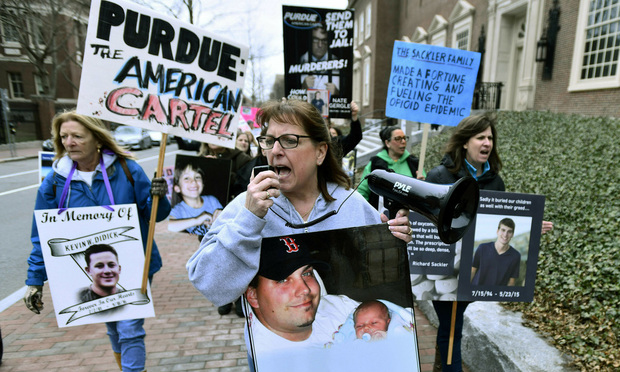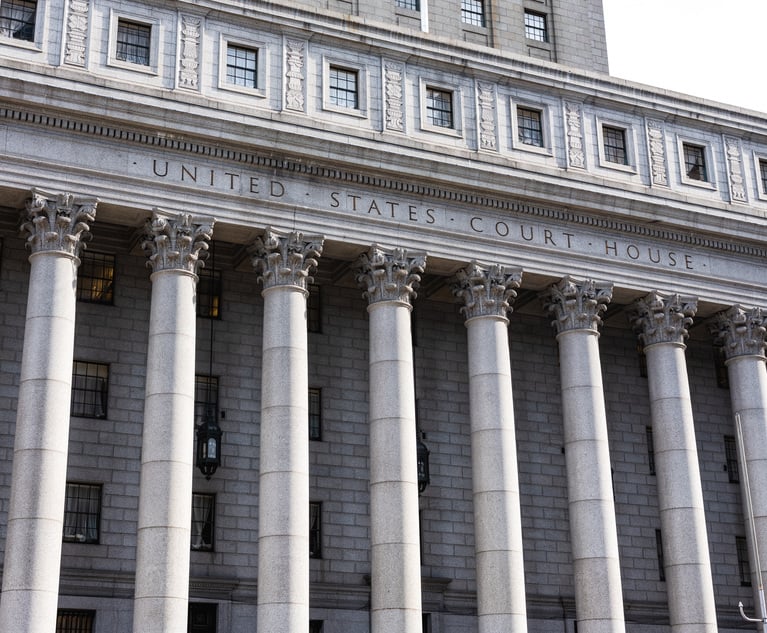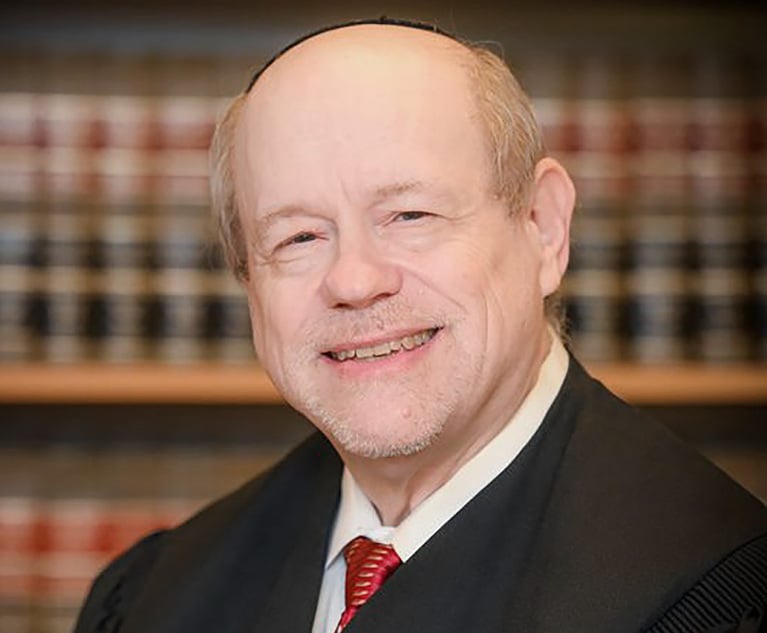NY Judge Allows Opioid Claims to Go Forward Against Sacklers
Suffolk County Supreme Court Judge Jerry Garguilo found two cities and 31 counties could move forward on their claims against the Sacklers, who are current and former directors of opioid manufacturer Purdue Pharma.
June 24, 2019 at 05:14 PM
4 minute read
 Cheryl Juaire of Marlborough, Mass., center, leads protesters near the Arthur M. Sackler Museum at Harvard University in Cambridge, Mass. Juaire, whose son was addicted to opioids and died of a heroin overdose in 2011, led the demonstration by parents who've lost children in the addiction epidemic.
Cheryl Juaire of Marlborough, Mass., center, leads protesters near the Arthur M. Sackler Museum at Harvard University in Cambridge, Mass. Juaire, whose son was addicted to opioids and died of a heroin overdose in 2011, led the demonstration by parents who've lost children in the addiction epidemic.
A New York judge has allowed a group of consolidated cases brought by several counties and cities in New York to pursue claims against the Sackler family in order to recoup millions of dollars in costs tied to the opioid crisis.
In a ruling Friday, Suffolk County Supreme Court Justice Jerry Garguilo found two cities and 31 counties had alleged sufficient facts to move forward against the Sacklers on their claims, which include public nuisance, negligence, fraud and New York's consumer fraud and false advertising laws.
“Here, although the court recognizes that the allegations as to certain of the Sacklers are lacking in detail, the plaintiffs have made a sufficient start to warrant discovery on the limited issue of whether any of the Sacklers is a 'primary actor,'” the judge wrote.
The ruling is the first to address whether claims over the opioid crisis could continue against the Sacklers, as current and former directors of opioid manufacturer Purdue Pharma, according to Paul Napoli, co-lead plaintiffs counsel in the New York case.
“The judge has given the right to do jurisdictional discovery, which will be brought, and which will begin to tell the story of each of these individual Sacklers and their relationship to the conduct that's the underlying basis not only to our case but to the attorney general cases,” said Napoli, of New York's Napoli Shkolnik. “So, we'll have that first bite of the apple.”
In 2018, Garguilo refused to dismiss the claims against several opioid companies, including distributors and manufacturers like Purdue.
The counties later added the Sacklers as individual defendants, as have attorneys general in several states, like Connecticut and New York, whose case is before the same judge. The Sacklers include former Purdue chairman and president Richard Sackler and seven other members of the Sackler family.
Neither Mary Jo White of Debevoise & Plimpton nor David Bernick, of Paul, Weiss, Rifkind, Wharton & Garrison, who both represent Sackler family members, responded to requests for comment.
According to Friday's ruling, the Sacklers had argued that they were not vicariously liable for the acts of Purdue's board of directors and that the cities and counties had failed to allege that any of them participated in making the alleged misstatements in the complaint. But Garguilo found that, under New York law, a director may be held individually liable for a company's tort action if he or she “directed, controlled, approved or ratified” the decision that lead to the injuries. And the complaint alleged the Sacklers, as “controlling directors” of Purdue, oversaw the company's marketing and targeting of doctors, among other things.
As to public nuisance, he wrote, “the Sacklers have failed to establish why public health is not a right common to the general public.” A public nuisance claim, he wrote, “may be an appropriate tool to address the consequential harm from the defendants' concerted efforts to market and promote their products for sale and distribution, particularly as such efforts are alleged to have created or contributed to a crisis of epidemic proportions.”
He upheld all the other claims, including fraud and consumer fraud allegations under New York law, while refusing to dismiss them on statutes of limitations grounds.
This content has been archived. It is available through our partners, LexisNexis® and Bloomberg Law.
To view this content, please continue to their sites.
Not a Lexis Subscriber?
Subscribe Now
Not a Bloomberg Law Subscriber?
Subscribe Now
NOT FOR REPRINT
© 2025 ALM Global, LLC, All Rights Reserved. Request academic re-use from www.copyright.com. All other uses, submit a request to [email protected]. For more information visit Asset & Logo Licensing.
You Might Like
View All
Decision of the Day: Qui Tam Relators Do Not Plausibly Claim Firm Avoided Tax Obligations Through Visa Applications, Circuit Finds

'Serious Legal Errors'?: Rival League May Appeal Following Dismissal of Soccer Antitrust Case
6 minute read
Decision of the Day: Judge Sanctions Attorney for 'Frivolously' Claiming All Nine Personal Injury Categories in Motor Vehicle Case

Trending Stories
- 1ACC CLO Survey Waves Warning Flags for Boards
- 2States Accuse Trump of Thwarting Court's Funding Restoration Order
- 3Microsoft Becomes Latest Tech Company to Face Claims of Stealing Marketing Commissions From Influencers
- 4Coral Gables Attorney Busted for Stalking Lawyer
- 5Trump's DOJ Delays Releasing Jan. 6 FBI Agents List Under Consent Order
Who Got The Work
J. Brugh Lower of Gibbons has entered an appearance for industrial equipment supplier Devco Corporation in a pending trademark infringement lawsuit. The suit, accusing the defendant of selling knock-off Graco products, was filed Dec. 18 in New Jersey District Court by Rivkin Radler on behalf of Graco Inc. and Graco Minnesota. The case, assigned to U.S. District Judge Zahid N. Quraishi, is 3:24-cv-11294, Graco Inc. et al v. Devco Corporation.
Who Got The Work
Rebecca Maller-Stein and Kent A. Yalowitz of Arnold & Porter Kaye Scholer have entered their appearances for Hanaco Venture Capital and its executives, Lior Prosor and David Frankel, in a pending securities lawsuit. The action, filed on Dec. 24 in New York Southern District Court by Zell, Aron & Co. on behalf of Goldeneye Advisors, accuses the defendants of negligently and fraudulently managing the plaintiff's $1 million investment. The case, assigned to U.S. District Judge Vernon S. Broderick, is 1:24-cv-09918, Goldeneye Advisors, LLC v. Hanaco Venture Capital, Ltd. et al.
Who Got The Work
Attorneys from A&O Shearman has stepped in as defense counsel for Toronto-Dominion Bank and other defendants in a pending securities class action. The suit, filed Dec. 11 in New York Southern District Court by Bleichmar Fonti & Auld, accuses the defendants of concealing the bank's 'pervasive' deficiencies in regards to its compliance with the Bank Secrecy Act and the quality of its anti-money laundering controls. The case, assigned to U.S. District Judge Arun Subramanian, is 1:24-cv-09445, Gonzalez v. The Toronto-Dominion Bank et al.
Who Got The Work
Crown Castle International, a Pennsylvania company providing shared communications infrastructure, has turned to Luke D. Wolf of Gordon Rees Scully Mansukhani to fend off a pending breach-of-contract lawsuit. The court action, filed Nov. 25 in Michigan Eastern District Court by Hooper Hathaway PC on behalf of The Town Residences LLC, accuses Crown Castle of failing to transfer approximately $30,000 in utility payments from T-Mobile in breach of a roof-top lease and assignment agreement. The case, assigned to U.S. District Judge Susan K. Declercq, is 2:24-cv-13131, The Town Residences LLC v. T-Mobile US, Inc. et al.
Who Got The Work
Wilfred P. Coronato and Daniel M. Schwartz of McCarter & English have stepped in as defense counsel to Electrolux Home Products Inc. in a pending product liability lawsuit. The court action, filed Nov. 26 in New York Eastern District Court by Poulos Lopiccolo PC and Nagel Rice LLP on behalf of David Stern, alleges that the defendant's refrigerators’ drawers and shelving repeatedly break and fall apart within months after purchase. The case, assigned to U.S. District Judge Joan M. Azrack, is 2:24-cv-08204, Stern v. Electrolux Home Products, Inc.
Featured Firms
Law Offices of Gary Martin Hays & Associates, P.C.
(470) 294-1674
Law Offices of Mark E. Salomone
(857) 444-6468
Smith & Hassler
(713) 739-1250






